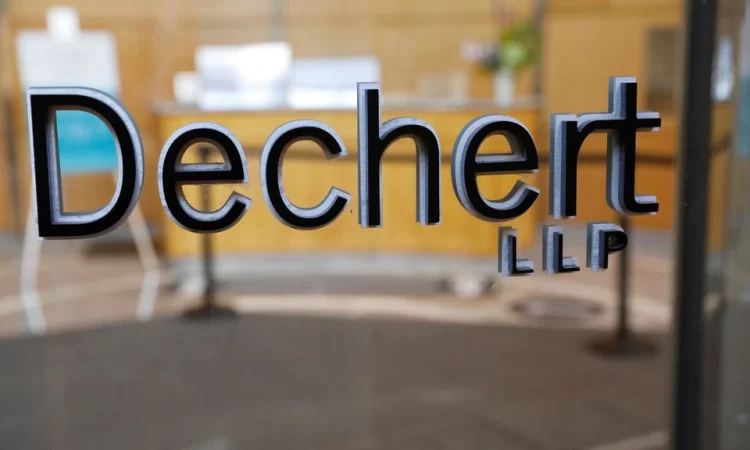Dechert Says It Has No More Docs To Give Iraqi TelecomDechert Says It Has No More Docs To Give Iraqi Telecom

By Lauren Berg
Dechert LLP has asked a Pennsylvania federal judge to reject an Iraqi telecommunications company’s bid seeking documents in its case alleging the law firm’s clients conspired to defraud the telecom of an US$800 million investment in a cellular network provider, saying there are no more documents to hand over.
Dechert said in a letter to the court on Monday that Iraq Telecom already has all but three responsive documents it requested in a subpoena, excepting those three that were withheld for privilege, and its latest request simply seeks the same documents for a second time.
And the BigLaw firm said it doesn’t even have access to some of the requested materials, because it never used a link to download them before that link expired.
Last week, Iraq Telecom — which is pursuing discovery in federal court for a foreign arbitration case over its claims — asked for a disclosure order, rejecting Dechert’s claim that many of the requested documents contain confidential legal strategy.
Iraq Telecom, which claims Dechert clients gifted London-area homes to Iraqi regulators in an effort to sabotage its US$800 million investment in Korek Telecom, has been battling for access to the law firm’s client communications since late 2019.
Last November, US District Judge R. Barclay Surrick told Dechert to turn over 464 documents, mostly emails, that its attorneys exchanged regarding the UK real estate deals, finding those messages are not privileged material. But the judge allowed the law firm to seal other documents containing its communications with two purported clients, Gergi B. Youssef and Mansour Farid Succar, who Iraq Telecom says purchased the London homes for the alleged bribery scheme.
The latest scrap involves messages between Dechert and Sandy Achkouty, a representative for Youssef and Succar, that Judge Surrick told Dechert to turn over within five days of his April 8 order.
Iraq Telecom said they’ve received most of those items, dating to late 2019 and early 2020, but that documents linked in two emails from February 2020 were not included. The company argued that those documents should be turned over, because a subpoena in the case — which the judge said this month covers the content of emails between Dechert and Achkouty — prohibits redaction or the exclusion of any attachments.
Court filings show that after sharing most of the requested materials with Iraq Telecom on April 12, Dechert refused to provide the disputed documents.
In its response letter Monday, Dechert said it doesn’t possess, nor can it retrieve, the documents in the Achkouty link. After that link was sent out, Dechert’s former clients’ counsel, Bo Ebby of Hangley Aronchick Segal Pudlin & Schiller, intervened and objected to the production of some documents, according to the letter.
And with respect to the other documents, the firm said it shouldn’t have to produce them, because Iraq Telecom already possesses them.
“What Iraq Telecom is really trying to obtain is not the documents themselves (because they already have those), but information about what privilege determinations Dechert was prepared to make before Mr. Ebby intervened on behalf of Dechert’s former clients,” the letter states.
“But Iraq Telecom is not entitled to those privilege determinations, which reveal the mental impressions and conclusions of Dechert’s internal counsel regarding privilege and are therefore subject to the work product protection,” it states.
Iraq Telecom — a joint venture of Kuwaiti logistics contractor Agility Public Warehousing Co. and French telecom giant Orange SA — has said another investor in Korek Telecom sought to “steal” its US$800 million stake by colluding with corrupt Iraqi officials, according to court filings.
Under that alleged scheme, Youssef and Succar acted as sham buyers of the London-area homes, which were given to regulators at Iraq’s Communications and Media Commission in exchange for favorable rulings that caused the seizure of Iraq Telecom’s investment, the company claims. Those allegations are the subject of a pending arbitration administered by the International Chamber of Commerce and a “contemplated proceeding” in the United Kingdom.
In November 2019, Iraq Telecom sought discovery against Dechert in federal court under Title 28 of the US Code, Section 1782, which governs assistance to foreign and international tribunals and to litigants with matters before such tribunals.
In a separate arbitration, Iraq Telecom is seeking up to US$100 million that it says the Intercontinental Bank of Lebanon owes after allegedly defrauding the telecom of a 2011 investment in Korek Telecom worth US$285 million. A federal judge in New York approved a US$3 million award for Iraq Telecom earlier this month, and a second round of arbitration is ongoing.
Counsel for the parties was not immediately available for comment.
Iraq Telecom is represented by Kristin N. Tahler of Quinn Emanuel Urquhart & Sullivan LLP and James T. Sandnes of Skarzynski Marick & Black LLP.
Dechert is represented in-house by general counsel Benjamin E. Rosenberg.
The case is Ex Parte Application Of Iraq Telecom Ltd. For An Order To Obtain Discovery For Use In Foreign Proceedings Pursuant To 28 USC 1782 et al., case number 2:19-mc-00175, in the US District Court for the Eastern District of Pennsylvania.
–Additional reporting by Caleb Symons and Jeannie O’Sullivan. Editing by Nicole Bleier.







